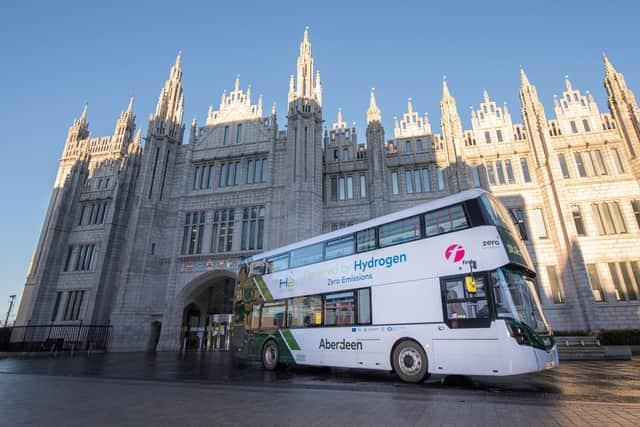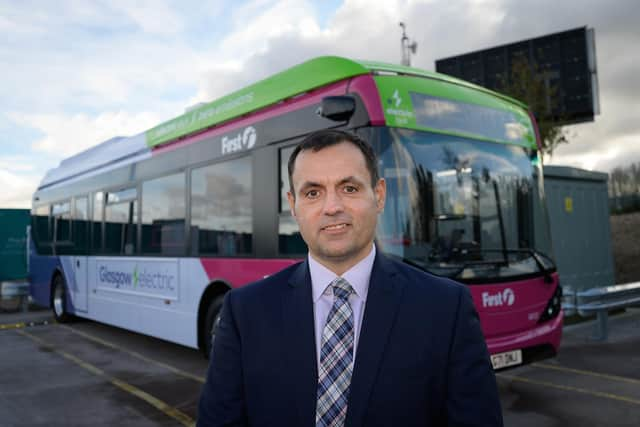We must not leave our workers behind on the journey to go green - Gary West
In today’s climate crisis, with no rewind or pause button to hand, the role of innovation is absolutely vital as it promises solutions and prospects in our current situation.
But while innovation is critical for our planet, it is not always met with such open arms by its people. It can be a tale of two halves; innovation can drastically improve - and even save – lives in some cases, but it can also impact on livelihoods if the right paths to manage its consequences or ambitions are not considered.
Advertisement
Hide AdAdvertisement
Hide AdThe history books tell us of the skilled mill workers who were suddenly left jobless as Britain’s industrial revolution introduced machine manufacturing to benefit trade and business on a mass scale. In more recent history, talented commercial artists, sky high in their profession, were suddenly left struggling to find work as computer-created graphic design swept in.
Whilst there are countless examples of new technology bringing change that is to the detriment of trained and experienced professionals, must it always be this way?
Innovation in the transport sector is happening in response to a significant challenge. But it is just not the usual ‘how can we make this faster, cheaper, safer?’ question – but a more pertinent ‘how can we continue to benefit from these vehicles, which we’ve become so reliant on, without causing further environmental impact?’
Hydrogen and electric buses are the innovations supporting our seismic transition. Their introduction into our fleet marks one of the largest systematic technological changes in generations.


This month saw the completion of our transformation works at Caledonia depot in Glasgow which has become the UK’s largest electric vehicle charging station. Having made the first strides last year, with the introduction of 22 electric buses, along with 11 advanced rapid charging units, there was a resounding feeling of hope about a greener future for the city of Glasgow.
We now have 98 electric buses in operation and 156 chargers in place. We’ve invested £63m in the regeneration works, which will see more than 175 electric and hydrogen buses travelling across major city routes in Scotland by the end of 2022, with a further 74 EVs planned for 2023. We’re also futureproofing depot infrastructure to support over 300 electric vehicle charging demands
In Aberdeen, our depot underwent its own significant transformation to make it ‘Hydrogen ready’ ahead of the arrival of the first 15 operational hydrogen double decker buses, marking a world first.
Whilst we are proud of these achievements, we recognise that it can’t just be new technology and infrastructure that we invest in – it’s important that we also invest in our employees. From our drivers, right through to those working in operations and engineering, our colleagues need to be upskilled on how to drive, operate, inspect, service and maintain our sizeable fleet of cutting-edge buses and charge points. Those working behind the scenes, originally trained on soon to be ‘outdated’ vehicles, must also be invested in on the journey to eco-conscious travel, as we take steps towards delivering on our commitment to achieving zero emissions by 2035.


Advertisement
Hide AdAdvertisement
Hide AdAt present, the education sector is extremely limited in its provision of specific training for hydrogen or electric vehicle technicians. We are part of a forward-moving industry that is leading the way with technology and equipment, and yet it is falling behind in training initiatives. A multi-channel effort is needed to ensure the current workforce is included on the journey to a greener future. We must collaborate as a company, and with those in our industry, to provide the right support to significantly enhance workers’ skills and introduce future talent. It is on us to make sure our staff become the experts, as their day jobs as they knew them evolve.
The education sector, the transport industry and trailblazer groups - who work to develop apprenticeship standards specific to the sector - all have a role to play as we transition to sustainable new technology. Our teams are an equally important part of the jigsaw - the future lies in their hands, and it is our job to provide the necessary tools needed for them to piece it all together. The last thing we want is for a repeat of history, and the outsourcing of experts when, given the opportunity, our skilled employees have all the attributes necessary to take on the work themselves.
The journey to is far from a challenge that the transport sector alone is facing. In this next predictable and considerable workplace shift in Britain’s history, businesses across all sectors must take more of a responsibility to offer new opportunities to, and maintain career paths of, their workers who risk being left in flux.
‘Out with the old, in with the new’, is an expression that I hope we’ll hear less of. It reflects a wasteful – not to mention a nonenvironmental – frame of mind. And it is this sort of sentiment that will haunt business and industry if there is no commitment to taking staff with us as we undertake the inevitable changes that lie ahead. A changing sector should be no excuse to leave staff behind; it is time we offer a greener future, not just to our environment, but to our employees as well.
- Gary West is the Engineering Director for First Bus Scotland
